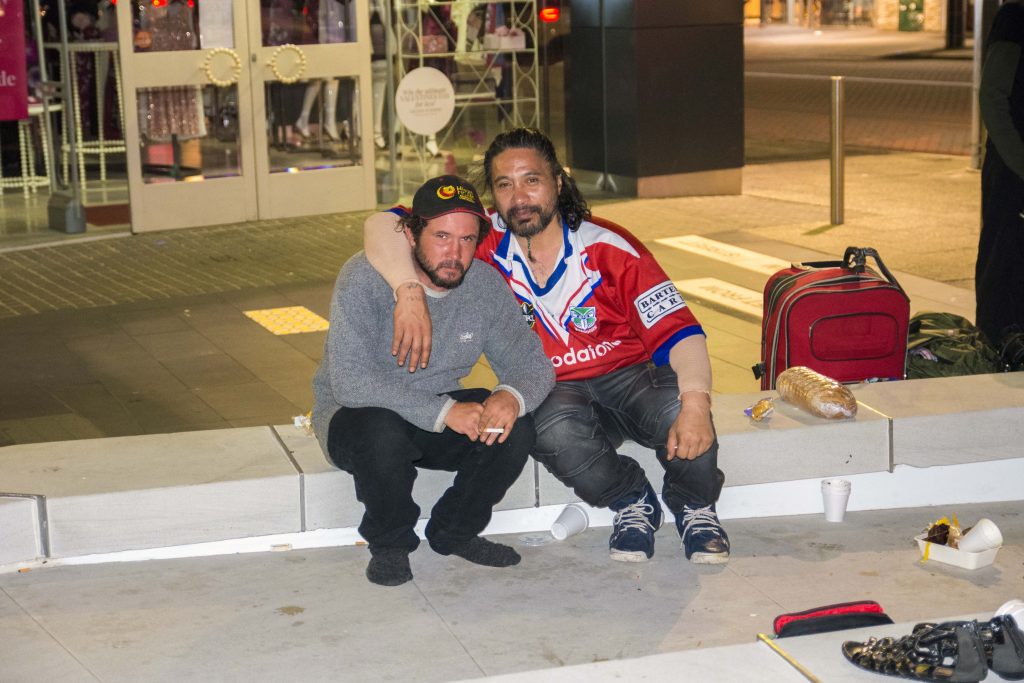
By Caroline Smith
When David came to Perth a number of years ago from New Zealand, he worked as a nursing assistant and had a house and family. But following an accident at work, he found himself without a wage or other monetary support, and in the events that followed, he ended up living on the streets.
On a recent Saturday night, he joined his friend Shaun at Wesley Church on William Street, where a number of other homeless people regularly gather together with members of the Holy Spirit of Freedom (HSOF) community, who hand out cups of coffee and soup, noodles and biscuits.
Like David, Shaun is also from New Zealand, and tells a similar story of being unable to support himself after a job loss.
Shaun says he normally sleeps in the city centre at night, but is often moved on, along with other people, by police.
Joining them in the crowd on Saturday night is Amy, who at nearly-17 years old, has only recently found a home with her family. She has spent years on and off the streets, putting pressure on her schooling – but she hopes to finish Year 12 this year, and perhaps find work as a hairdresser. When asked why she came down to the city tonight, she says “I like seeing the Christians here. They talk to us and help out with food and other things.”
Mark Reidy – a former journalist with The Record – is one member of the HSOF community in Perth, and a regular on these Saturday nights, as well as working at Archdiocesan agency Daydawn throughout the week.
He said that after years of work in this area, he has seen a notable increase in homelessness in the past few years, which he mainly attributes to family break ups.
“Every time I go out I see new people – sometimes if I started chatting people would say, ‘look I’ve never been on the streets before’,” he said.
“Sometimes they have been employed in the mining industry and have lost their job or had a relationship breakup which sometimes comes about through mining and FIFO (fly-in, fly-out) work.
“We’re seeing more and more people who’ve never been homeless before – they don’t know where to get ‘a feed’ or where to sleep.”
However, Mr Reidy added that people in these circumstances often did not stay on the streets for long, since family and other support was often available.
“With the people that often end up on the streets longer term, there are many reasons. “Family breakdown is a primary reason and the escalation [in the use] of [crystal] meth seems to accelerating this breakdown,” he said.
“You just can’t have someone who is on drugs in your home, it just doesn’t work. So there might be a family network, but the bridges have been burnt.”
He said the effect of the use of methamphetamines were the worst he had seen in 30 years of working with people on the streets, because it made people violent and often impacted their mental health as well.
There were other circumstances which forced people onto the streets, he added, often from childhood.
“There are young kids who have been brought up in the welfare system and they’re half running away and then become trapped in the street life in their 20s and 30s,” Mr Reidy said.
“Younger people can be harder to engage with because if they’re under 16, they’ve often run away from a refuge, or they’re under government care so you’ve got to try to direct them home.
“If they come with a friend who knows me, they’ll say, these guys are okay.”
He added that with young people under the age of 18, the Department of Child Protection (DCP) had a responsibility to find them somewhere to stay. But a desire to avoid going home, or to the hostel where they normally lived, often made them reticent about talking about their situation.
Reflecting on the work of the HSOF community, Mr Reidy said it was about more than providing food and drinks to the people he encounters.
“We go out with coffee, but that’s more of an excuse to have a chat with someone. I used to work on a soup van in Melbourne when I was about 19, and people would come to get soup, and then you have a chat.
“Some will talk about the weather, others will ask about where to get food – most people will know, but sometimes they don’t.
“So I might tell them, or I might introduce them to someone who’s been on the streets for a bit longer, and say, can you look after this person?”
He said community members went out several times a week, but night time was often when people were most vulnerable and lonely, and that company – rather than food – was what they lacked the most when living on the streets.
“It’s like Mother Teresa said, the real poverty of the West is loneliness,” he said.
“You go to India and people are starving, and we have a community in the Philippines where the situation is similar – the people there have got family, but they’re sleeping on the streets, so their hunger is for food.
“Whereas the hunger here is for belonging. So that’s our call.”
In the conversations that follow, Mr Reidy said he would speak to people about God, but only if the other person was open to it.
“We get some people who are angry with God, who say, look at what he’s done to my life.
“But then you find others who are very spiritual.
“We work on whatever people want to ask us about – the footy, weather, their family, or sometimes they’ll say, ‘Mark can we have some prayer?’”
For more information about the Holy Spirit of Freedom community, go to www.hsof.net.